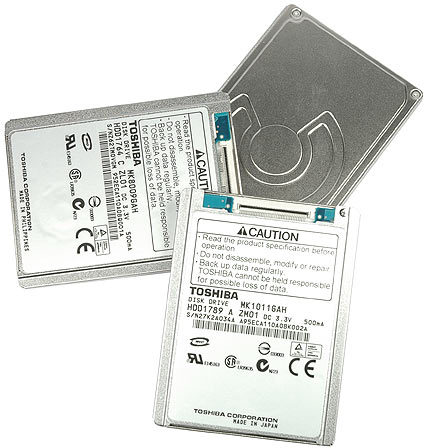1.8" Hard Drives Hit 100 GB
Toshiba First At 100 GB
Hard drives are the components experiencing the strongest growth, as storage is an essential element in the convergence of the classic PC and consumer electronics. Mobile 2.5" hard drives are not only used in notebooks, but also in certain lifestyle computers, and robust model variations are about to conquer the car market as well. Desktop 3.5" hard drives have exceeded the terabyte mark and continue to be the backbone for servers, PCs and consumer devices such as PVRs and set-top boxes. But there are more and more mobile devices that satisfy our communication or entertainment requirements, and these devices require smaller storage products.
The smallest possible way of storing several gigabytes of data is flash memory, which you know from USB memory sticks or the memory cards from your digital camera. Flash is a transistor-based technology for non-volatile data storage. Unlike from other silicon transistors, flash cells have two gates - the second one, called the floating gate, is insulated and can trap electrons and thus store information. Current flash technology allows companies to build flash memory products up to 16 GB in size, or so-called solid-state/flash hard drives at up to 32 GB for an acceptable cost. However, 32 GB typically is not enough storage for modern computers anymore - Windows Vista itself requires approximately 10 GB just for its system files. So, the hard drive will not die out any time soon, as its capacities start where flash is at its top end. However, 0.8" and 1" hard drive are exceptions: flash memory capacities have outgrown the maximum sizes possible on these tiny form factors.
Even 2.5" hard drives will reach 250 GB later this year, but these aren't necessarily ideal for ultra-portable devices such as iPods - they only need 30 or 80 GB of capacity and can benefit from the smaller size, lower weight and lower power consumption of 1.8" hard drives. Hitachi has had 1.8" hard drives for a couple of years with its Travelstar C3K80 and C4K60/40, Samsung's N40 has been around for some time and Toshiba has some extensive experience as well. About a year ago we took a look at three 1.8" hard drives by Hitachi and Toshiba, and the advent of the first 100 GB drive is a good reason to look at this segment again. We decided to focus on the new 100 GB Toshiba drive, as Samsung is close to releasing a 120 GB drive, while Hitachi's C3K80 runs at only 3,600 RPM, lower than the 4,200 RPM spindle speed that can be considered standard today.
Get Tom's Hardware's best news and in-depth reviews, straight to your inbox.
Current page: Toshiba First At 100 GB
Next Page Drive Form Factors: Why 1.8"?
Patrick Schmid was the editor-in-chief for Tom's Hardware from 2005 to 2006. He wrote numerous articles on a wide range of hardware topics, including storage, CPUs, and system builds.
